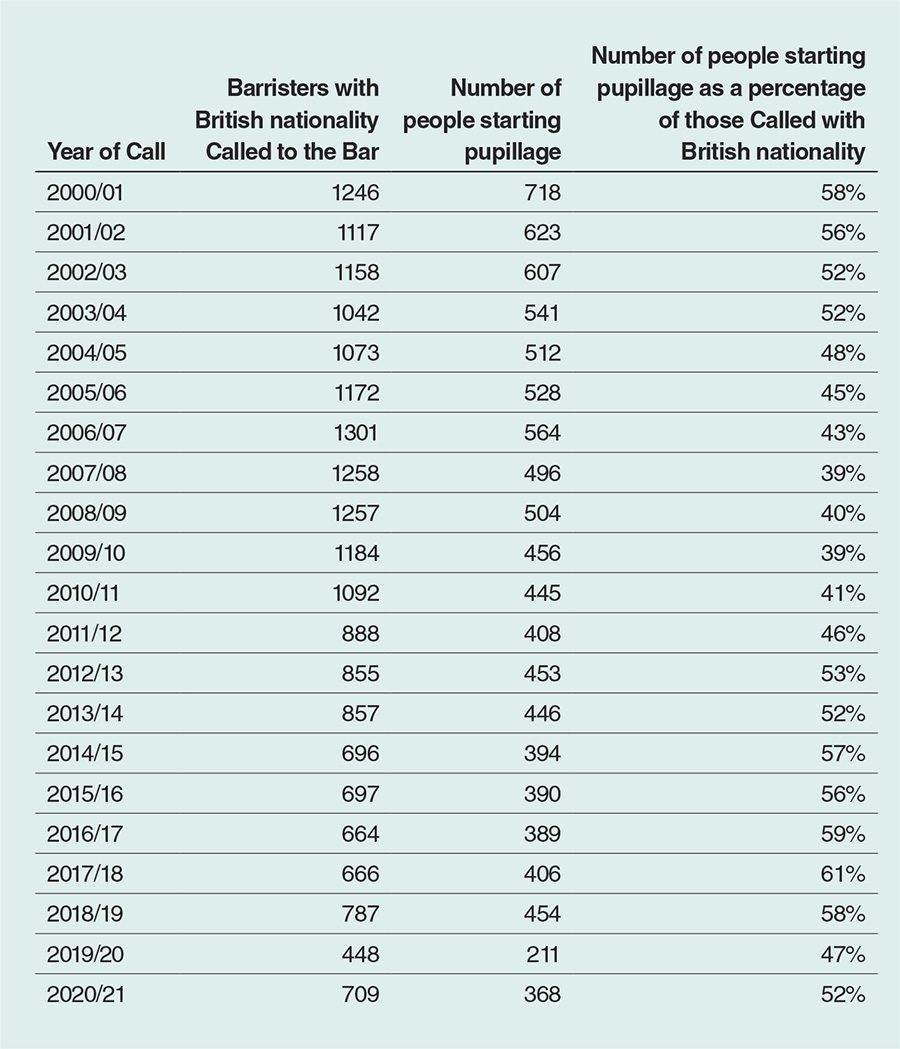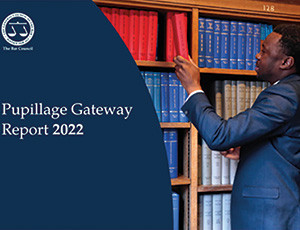*/

The Bar Council crunches the data to tell the real story of who gets pupillage... and when
It’s no secret that securing pupillage is hard work and very competitive, but how competitive? How good (or otherwise) are your chances? And what are the odds?
Data on who gets pupillage is readily available from the Bar Standards Board (BSB) and the Bar Council's Pupillage Gateway, but it can be difficult to understand what it really means for individual candidates.
Following a dip during the pandemic, the number of available pupillage places has bounced back and in the 2022/23 application round 638 places were advertised by Authorised Education and Training Organisations (AETOs) through the Pupillage Gateway.
In the 2021/22 recruitment round 2,782 people applied for 486 places via the Pupillage Gateway. On the face of it some simple maths tells us that every applicant had one in six (or 17%) chance. Right?
Not quite.
In any one year each of the candidates has about a one in six chance of success, but applicants can apply up to five times after they have completed the Bar course (and more with a waiver from the BSB). In any given year the total number of people applying includes a proportion who are applying for a second, third, fourth or fifth time. So, the chances that, sooner or later, a person who has been called to the Bar will get pupillage, is much better than 1 in 6.
For instance, those applying through the Pupillage Gateway for the first time in 2021/22 made up 45.4% of the total who secured pupillage, meaning that more than half of the successful applicants were trying for at least their second time.
When embarking on any career, it’s important to understand what will give you the best chance of success. So here we break down the data to tell you the real story of who gets pupillage.
Many people get called to the Bar but are intending to practise overseas, and therefore don’t seek pupillage in England and Wales. When we look at the data over time comparing the number of people with British nationality called to the Bar against the number of people securing pupillage it shows much more favourable odds than one in six. (See table, below.)
So, a better – and more accurate – way to look at it is, if you get called to the Bar, and you are intending to practise here, you’ve got something like a 1 in 2 chance of securing pupillage eventually.
Some people give up if they don’t get pupillage first time round and pursue a different career. But some people apply again, and again. You might expect that if you use the time to improve your skills or qualifications, that is a worthwhile thing to do, and the figures seem to bear this out.
In fact, according to the Pupillage Gateway Report, in 2021/22 of the large number of people applying for the first time, only 11% succeeded, but of the (much smaller) number of people applying for the fourth time, 17% succeeded.
In terms of total numbers, candidates are most likely to be successful after completing one to three rounds of pupillage applications.
So, although there is no specific data or research to explain these figures, it’s reasonable to assume that those applying more than once have taken the time to fill any gaps in their experience, develop their skills, and tailor their applications to the AETOs they are applying to.
If you don’t succeed on your first attempt, have a look at the advice online about what makes a good application and consider asking a barrister to take a look over your application to advise on how you can improve it.
Applicants with a first-class degree go on to gain pupillage in the greatest proportions. According to the BSB analysis, around 60% of such graduates gain pupillage in the long run. In 2021/22, Pupillage Gateway candidates with a first-class degree were 2.4 times more likely to receive an offer compared to those who obtained a 2:1. And typically, less than one in five of those with a 2:2 degree class go on to pupillage.
Success in the BPTC or equivalent vocational component course is also a factor. In the 2021/22 round 25.7% of candidates who achieved Outstanding secured an offer, compared to 10.3% who achieved Very Competent and 3% who achieved Competent.
The grades you achieve have the greatest impact on your likelihood of success in securing pupillage. But what subject you study does not appear to have an effect. The Pupillage Gateway Report found nothing to suggest that those who have not studied law at undergraduate level are at a disadvantage in obtaining pupillage.

Source: The Bar Council
Pupillage Gateway analysis reveals that on gender a slightly higher proportion of women (9.6%) than men (9.4%) received an offer of pupillage in the 2021/22 round.
BSB analysis on gender also controls for degree class and it found over the period of analysis (from 2011/12 to 2021/22) that there is a trend of men with a first-class degree obtaining pupillage in greater proportions than women with the same degree class.
On disability, the Pupillage Gateway analysis found that applicants without a disability were more likely to receive an offer of pupillage than those with a disability. But the BSB analysis found no clear trends.
Some good news is that the proportions of the cohort that secures pupillage is broadly representative of the population in relation to ethnicity. The Bar has done a lot of work over the years to proactively encourage those from underrepresented backgrounds to join the profession.
However, at the application stage White candidates are more likely to secure pupillage than those from ethnic minority backgrounds. In 2021/22, 13.1% of White candidates secured pupillage compared to 5.1% of Asian/Asian British candidates, and 3.6% of Black/African/Caribbean/Black British candidates. BSB analysis shows that the disparity exists even when controlling for degree class.
Clearly, more work needs to be done to understand what is happening. There are some excellent organisations working to support individual candidates, such as Bridging the Bar, which supports students who, owing to their disability, ethnic background, socio-economic background, education, sexuality, or other characteristic, belong to groups that are underrepresented at the Bar.
Candidates in receipt of a scholarship from the Inns of Court are 3.2 times more likely to secure pupillage than those without. In 2021/22 18% of candidates with a scholarship secured pupillage compared to 5.6% of candidates who did not have a scholarship.
This is likely to be because the Inns’ selection processes for scholarships select for the same characteristics as those that pupillage providers are looking for, and the interview process and types of questions may have some similarities.
The vast majority of pupillages are advertised through the Pupillage Gateway and candidates use the Gateway to make their applications. The Gateway is run by the Bar Council on behalf of the Bar.
By facilitating the use of the BSB’s mandatory timetable, the Pupillage Gateway has created the fairest process for applications. All offers are made on the same day with the same deadline for acceptance. That means that applicants are no longer forced to accept an early offer for fear of missing out on another offer later down the line.
The Gateway also includes tools for pupillage providers to make their processes as fair as possible, including anonymised applications that reduce unconscious bias in candidate selection in the early stages. The Bar Council has recently announced that contextual recruitment tools will be added to the Gateway to improve the process further.


It’s no secret that securing pupillage is hard work and very competitive, but how competitive? How good (or otherwise) are your chances? And what are the odds?
Data on who gets pupillage is readily available from the Bar Standards Board (BSB) and the Bar Council's Pupillage Gateway, but it can be difficult to understand what it really means for individual candidates.
Following a dip during the pandemic, the number of available pupillage places has bounced back and in the 2022/23 application round 638 places were advertised by Authorised Education and Training Organisations (AETOs) through the Pupillage Gateway.
In the 2021/22 recruitment round 2,782 people applied for 486 places via the Pupillage Gateway. On the face of it some simple maths tells us that every applicant had one in six (or 17%) chance. Right?
Not quite.
In any one year each of the candidates has about a one in six chance of success, but applicants can apply up to five times after they have completed the Bar course (and more with a waiver from the BSB). In any given year the total number of people applying includes a proportion who are applying for a second, third, fourth or fifth time. So, the chances that, sooner or later, a person who has been called to the Bar will get pupillage, is much better than 1 in 6.
For instance, those applying through the Pupillage Gateway for the first time in 2021/22 made up 45.4% of the total who secured pupillage, meaning that more than half of the successful applicants were trying for at least their second time.
When embarking on any career, it’s important to understand what will give you the best chance of success. So here we break down the data to tell you the real story of who gets pupillage.
Many people get called to the Bar but are intending to practise overseas, and therefore don’t seek pupillage in England and Wales. When we look at the data over time comparing the number of people with British nationality called to the Bar against the number of people securing pupillage it shows much more favourable odds than one in six. (See table, below.)
So, a better – and more accurate – way to look at it is, if you get called to the Bar, and you are intending to practise here, you’ve got something like a 1 in 2 chance of securing pupillage eventually.
Some people give up if they don’t get pupillage first time round and pursue a different career. But some people apply again, and again. You might expect that if you use the time to improve your skills or qualifications, that is a worthwhile thing to do, and the figures seem to bear this out.
In fact, according to the Pupillage Gateway Report, in 2021/22 of the large number of people applying for the first time, only 11% succeeded, but of the (much smaller) number of people applying for the fourth time, 17% succeeded.
In terms of total numbers, candidates are most likely to be successful after completing one to three rounds of pupillage applications.
So, although there is no specific data or research to explain these figures, it’s reasonable to assume that those applying more than once have taken the time to fill any gaps in their experience, develop their skills, and tailor their applications to the AETOs they are applying to.
If you don’t succeed on your first attempt, have a look at the advice online about what makes a good application and consider asking a barrister to take a look over your application to advise on how you can improve it.
Applicants with a first-class degree go on to gain pupillage in the greatest proportions. According to the BSB analysis, around 60% of such graduates gain pupillage in the long run. In 2021/22, Pupillage Gateway candidates with a first-class degree were 2.4 times more likely to receive an offer compared to those who obtained a 2:1. And typically, less than one in five of those with a 2:2 degree class go on to pupillage.
Success in the BPTC or equivalent vocational component course is also a factor. In the 2021/22 round 25.7% of candidates who achieved Outstanding secured an offer, compared to 10.3% who achieved Very Competent and 3% who achieved Competent.
The grades you achieve have the greatest impact on your likelihood of success in securing pupillage. But what subject you study does not appear to have an effect. The Pupillage Gateway Report found nothing to suggest that those who have not studied law at undergraduate level are at a disadvantage in obtaining pupillage.

Source: The Bar Council
Pupillage Gateway analysis reveals that on gender a slightly higher proportion of women (9.6%) than men (9.4%) received an offer of pupillage in the 2021/22 round.
BSB analysis on gender also controls for degree class and it found over the period of analysis (from 2011/12 to 2021/22) that there is a trend of men with a first-class degree obtaining pupillage in greater proportions than women with the same degree class.
On disability, the Pupillage Gateway analysis found that applicants without a disability were more likely to receive an offer of pupillage than those with a disability. But the BSB analysis found no clear trends.
Some good news is that the proportions of the cohort that secures pupillage is broadly representative of the population in relation to ethnicity. The Bar has done a lot of work over the years to proactively encourage those from underrepresented backgrounds to join the profession.
However, at the application stage White candidates are more likely to secure pupillage than those from ethnic minority backgrounds. In 2021/22, 13.1% of White candidates secured pupillage compared to 5.1% of Asian/Asian British candidates, and 3.6% of Black/African/Caribbean/Black British candidates. BSB analysis shows that the disparity exists even when controlling for degree class.
Clearly, more work needs to be done to understand what is happening. There are some excellent organisations working to support individual candidates, such as Bridging the Bar, which supports students who, owing to their disability, ethnic background, socio-economic background, education, sexuality, or other characteristic, belong to groups that are underrepresented at the Bar.
Candidates in receipt of a scholarship from the Inns of Court are 3.2 times more likely to secure pupillage than those without. In 2021/22 18% of candidates with a scholarship secured pupillage compared to 5.6% of candidates who did not have a scholarship.
This is likely to be because the Inns’ selection processes for scholarships select for the same characteristics as those that pupillage providers are looking for, and the interview process and types of questions may have some similarities.
The vast majority of pupillages are advertised through the Pupillage Gateway and candidates use the Gateway to make their applications. The Gateway is run by the Bar Council on behalf of the Bar.
By facilitating the use of the BSB’s mandatory timetable, the Pupillage Gateway has created the fairest process for applications. All offers are made on the same day with the same deadline for acceptance. That means that applicants are no longer forced to accept an early offer for fear of missing out on another offer later down the line.
The Gateway also includes tools for pupillage providers to make their processes as fair as possible, including anonymised applications that reduce unconscious bias in candidate selection in the early stages. The Bar Council has recently announced that contextual recruitment tools will be added to the Gateway to improve the process further.

The Bar Council crunches the data to tell the real story of who gets pupillage... and when


Now is the time to tackle inappropriate behaviour at the Bar as well as extend our reach and collaboration with organisations and individuals at home and abroad
A comparison – Dan Monaghan, Head of DWF Chambers, invites two viewpoints
And if not, why not? asks Louise Crush of Westgate Wealth Management
Marie Law, Head of Toxicology at AlphaBiolabs, discusses the many benefits of oral fluid drug testing for child welfare and protection matters
To mark International Women’s Day, Louise Crush of Westgate Wealth Management looks at how financial planning can help bridge the gap
Casey Randall of AlphaBiolabs answers some of the most common questions regarding relationship DNA testing for court
Maria Scotland and Niamh Wilkie report from the Bar Council’s 2024 visit to the United Arab Emirates exploring practice development opportunities for the England and Wales family Bar
Marking Neurodiversity Week 2025, an anonymous barrister shares the revelations and emotions from a mid-career diagnosis with a view to encouraging others to find out more
David Wurtzel analyses the outcome of the 2024 silk competition and how it compares with previous years, revealing some striking trends and home truths for the profession
Save for some high-flyers and those who can become commercial arbitrators, it is generally a question of all or nothing but that does not mean moving from hero to zero, says Andrew Hillier